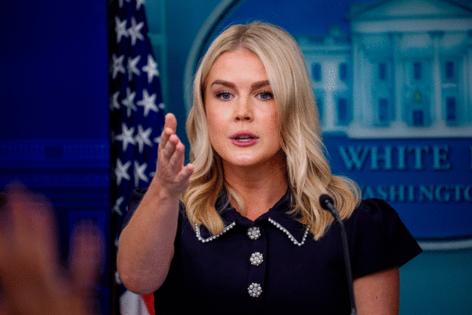White House says it got Maduro's letter, but it was filled with lies; rejects talks
Published in News & Features
In the wake of escalating military actions and a fiery diplomatic exchange, the White House on Monday said it had dismissed a letter from Venezuelan ruler Nicolás Maduro offering direct talks with President Donald Trump’s administration, accusing Caracas of spreading falsehoods and continuing to play a central role in illegal drug trafficking.
“We have seen this letter. Frankly, I think there were a lot of lies repeated by Maduro in that letter, and the administration’s position on Venezuela has not changed,” said White House press secretary Karoline Leavitt. “We view the Maduro regime as illegitimate, and the president has clearly shown that he’s willing to use any and all means necessary to stop the illegal trafficking of deadly drugs from the Venezuelan regime into the United States.”
Maduro’s letter, dated Sep. 6 and released publicly over the weekend, was sent days after the U.S. military conducted a lethal strike on a vessel originating from Venezuela. Eleven people were killed in the operation, which the Trump administration claimed — without providing public evidence — was targeting members of the Tren de Aragua gang involved in drug smuggling.
Three similar operations soon followed, bringing the total number of alleged drug traffickers killed to 17.
In the letter, Maduro rejected Washington’s accusations that he and members of his regime are involved in drug trafficking. “This is the most egregious instance of disinformation against our nation, intended to justify an escalation to armed conflict that would inflict catastrophic damage across the entire continent,” he wrote.
Maduro insisted in his letter that Venezuela’s role in regional drug trafficking has been exaggerated and politically manipulated. He stated that just 5% of Colombia’s drug output passes through Venezuela, with 70% of that already neutralized by Venezuelan authorities.
Addressing Trump directly, Maduro expressed a willingness to engage diplomatically. “President, I hope that together we can defeat the falsehoods that have sullied our relationship, which must be historic and peaceful,” he wrote. “These and other issues will always be open for a direct and frank conversation with your special envoy (Richard Grenell) to overcome media noise and fake news.”
Maduro pointed to Grenell’s past involvement in resolving disputes — including organizing deportation flights and facilitating the release of detained U.S. citizens — as proof that channels of communication remained open. “To date, this channel has functioned flawlessly,” he noted.
Despite Maduro’s diplomatic tone, rhetoric in Washington has intensified. Trump, speaking Saturday on his Truth Social account, issued a stark ultimatum, demanding that Venezuela accept the return of individuals he claimed had been “forced into the United States” from the country’s prisons and asylums.
“We want Venezuela to immediately accept all prisoners and people from mental institutions — including those from the worst asylums in the world — that the Venezuelan ‘leadership’ has forced into the United States of America,” Trump wrote. “Thousands of people have been badly hurt and even killed by these ‘Monsters.’ GET THEM THE HELL OUT OF OUR COUNTRY, RIGHT NOW, OR THE PRICE YOU PAY WILL BE INCALCULABLE!”
So far, there has been no formal response from the Venezuelan government to Trump’s demands. However, deportation flights — including some directly to Caracas — have continued uninterrupted, according to regime sources.
_____
©2025 Miami Herald. Visit miamiherald.com. Distributed by Tribune Content Agency, LLC.







Comments